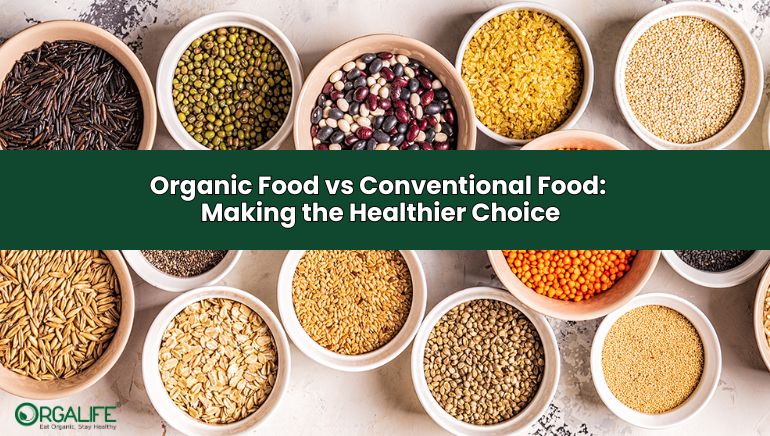Organic Food vs Conventional Food: Making the Healthier Choice
In recent years, the demand for organic food has seen a significant rise, driven by increasing awareness of health, environmental sustainability, and food safety. But with supermarkets offering both organic and conventional options side by side, many people are left wondering: What’s the real difference between organic food and conventional food? And more importantly, why choose organic food over its conventional counterpart?
Understanding the Basics: Organic vs Conventional
Organic food is grown and processed without the use of synthetic fertilizers, pesticides, genetically modified organisms (GMOs), antibiotics, or growth hormones. Instead, it relies on natural methods like crop rotation, composting, and biological pest control to maintain soil fertility and manage pests.
Conventional food, on the other hand, is produced using modern agricultural techniques that often involve chemical fertilizers, pesticides, and GMOs. While these methods aim to maximize yield and reduce production costs, they also raise concerns about long-term environmental and health impacts.
Nutritional Value and Health Benefits
One of the primary reasons people gravitate towards organic food is the belief that it is more nutritious. Several studies suggest that organic fruits and vegetables can have higher antioxidant levels than conventionally grown produce. Additionally, organic dairy and meat often contain more omega-3 fatty acids, which are beneficial for heart health.
Moreover, organic food reduces exposure to harmful pesticides and heavy metals. Although conventional foods generally fall within “safe” limits for pesticide residues, repeated exposure—even at low levels—can build up in the body and potentially lead to health complications over time.
Choosing organic means minimizing your intake of synthetic chemicals, antibiotics, and hormones, especially critical for children, pregnant women, and those with compromised immune systems.

Environmental Impact
Organic farming is designed with sustainability in mind. It focuses on maintaining soil health, preserving water quality, and promoting biodiversity. Practices like crop rotation, cover cropping, and reduced tillage improve soil structure and reduce erosion.
In contrast, conventional farming’s heavy dependence on synthetic inputs can degrade soil over time, pollute waterways with runoff, and harm beneficial insects like bees and butterflies.
By supporting organic agriculture, consumers contribute to a more balanced ecosystem and a reduced carbon footprint. This is an important factor for those concerned with climate change and ecological preservation.

Taste and Freshness
Many people report that organic food simply tastes better. Since organic produce is often grown in healthier soil and harvested closer to peak ripeness, it tends to have a richer, more natural flavor.
Additionally, organic food is usually fresher because it lacks preservatives used to extend shelf life. This freshness not only enhances taste but also retains more nutrients.
Price: A Justified Premium?
It’s true—organic food often comes with a higher price tag. This is mainly due to more labor-intensive farming practices, higher certification costs, and smaller-scale production. However, many consumers view this as an investment in better health and a cleaner environment.
When weighed against the potential long-term costs of healthcare and environmental degradation, many believe the premium for organic food is justified.
Why Choose Organic Food?
Summing up, here are key reasons why choosing organic food is a smart decision:
- Healthier nutrition with fewer chemicals and more antioxidants.
- Better for the environment, promoting soil health, clean water, and biodiversity.
- Ethical farming practices, with a focus on animal welfare and sustainability.
- Superior taste and freshness, without artificial preservatives.
- Supports local and small farmers, who often rely on organic methods.
Making the switch to organic doesn't mean you have to overhaul your entire lifestyle overnight. Start small—perhaps with fruits and vegetables, or by replacing pantry staples like grains and oils. Over time, these small choices can lead to big benefits.

Orgalife: Your Partner in Going Organic
If you're ready to embrace organic living, Orgalife is here to support your journey. With a wide selection of certified organic products, including grains, pulses, oils, spices, and natural sweeteners, Orgalife is committed to delivering quality, purity, and sustainability in every package. Their transparent sourcing and eco-friendly practices ensure that you're not just buying food—you're investing in a healthier future for yourself and the planet.
Visit www.orgalife.in today to explore their thoughtfully curated range and take the first step toward a better, cleaner way of eating.


